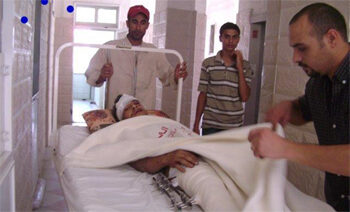ABM Archive Website
THIS WEBSITE CONTAINS ARCHIVE MATERIALS FOR HISTORICAL REFERENCE ONLY
For up-to-date information, including our latest appeals, news, and resources, please visit our current website.
Latest update from Ahli-Arab Hospital in gaza
27/08/14
 |
| AAH medical team treating a patient affected by the war ©AAH 2014 |
The Ahli Arab Hospital continues its mission to serve those in need especially during this period, with the current ceasefire agreement, where people have a chance to recover. The hospital has many displaced families who are in need of medical treatment and many who have been traumatised by the devastating war.
Humanitarian Situation Update
- Over 2,101 Palestinians killed, including at least 1,460 civilians, of whom 493 are children and 253 are women.
- 142 families in Gaza have lost at least three or more members in the same incident, totalling 739 fatalities.
- 10,224 Palestinians, including 3,106 children and 1,970 women and 368 elderly, have been injured.
- Preliminary estimates indicate that up to 1,000 of the children injured will have a permanent disability.
- 67 Israelis killed, including 64 soldiers, 3 civilians in addition to one foreign national.
- 500,000 children in Gaza are unable to start the new school year.
- 16 hospitals damaged out of 32 with 6 hospitals closed.
- 45 clinics damaged out of 97 with 17 clinics closed.
- 137 schools damaged.
- 475,000 people hosted at UNRWA (approx. 290,000), government shelters and with host families.
- At least 373,000 children require direct and specialized psychosocial support on the basis of families who have experienced death, injury or loss of home.
- Explosive remnants of war are left in civilian areas affected by conflict, causing a major threat to children.
Response of Ahli Arab Hospital (AAH)
- On August 16th, AAH staff met with 32 of their partners-CBOs (Community Based Organizations) to assess their needs. Among the needs that were highly emphasized were the free medical care missions as well as psychosocial support to all members of the community including mothers, children, adults and elderly. They also asked for training programs for the community health workers in first aid, psychosocial support, health education about hygiene and sanitation. Additionally, they expressed the need for cleaning substances for sanitation and hygiene. As they are close to the opening of the schools, they expressed the need for uniform and school bags for children.
- AAH already started to run psychosocial activities in the form of joyful days for children.
- During this period AHH has distributed first aid packages for the CBOs as well as for focal points in the shelters so as to enable them to perform the first aid procedures for injured as needed.
- AAH was able to distribute clothing for new born children (clothing was received from UNICEF).
- AAH has received since the beginning of the Gaza Emergency 4,300 cases, of which more than 35% suffer from physical casualties.
- AAH is currently treating 20 in-patients suffering from severe injuries.
- AAH receives on average per day 45 burn cases as a result of the war; of which 50% are children.
- AAH receives on average per day 120 new cases (mostly children) affected by inadequate hygiene (partly because of large amounts of refuse not collected), lack of water, and food shortages. As a result, children suffer chest infections, diarrhoea, rashes and scabies.
Needs of Ahli Arab Hospital
- Due to the huge number of displaced people particularly children and women who are in need of psychosocial care, Al-Ahli needs to initiate a free outreach treatment service for the displaced people.
- There is a great need to provide hygiene and cleaning kits for displaced families.
- Due to the huge number of children and women who are in need of psychosocial care, AAH needs to increase intensively the psychosocial services. Therefore furniture for the new psychosocial support unit is needed.
- Hiring of new staff for at least a one year period to stand up to the needs of responding to and supporting patients and their families.
< Back


